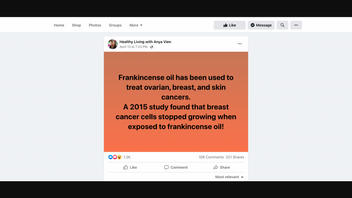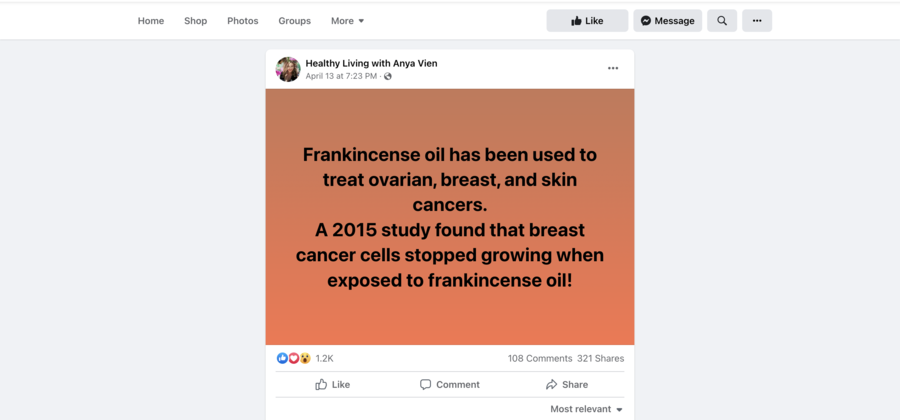
Does frankincense oil treat cancer? No, there's no evidence to support that: While some lab studies have shown that frankincense oil will cause cell suicide in cancer cells, there is no evidence that it can treat cancer in a human body. Australia's Cancer.org says there are a small number of studies that show that frankincense oil has an effect on cancer cells, but much more research is needed to see if it is an effective form of therapy. The Food and Drug Administration (FDA) has not approved frankincense oil as a drug.
The claim appeared in a Facebook post on April 13, 2022. It opens:
Frankincense oil has been used to treat ovarian, breast, and skin cancers. A 2015 study found that breast cancer cells stopped growing when exposed to frankincense oil!
This is what the post looked like on Facebook at the time of writing:
The 2015 article mentioned in this Facebook post is from the Asian Pacific Journal of Tropical Biomedicine. The article, titled, "Frankincense derived heavy terpene cocktail boosting breast cancer cell (MDA-MB-231) death in vitro," says this experiment resulted in the death of cancer cells through the use of frankincense oil. However, that does not mean the cancerous area cannot make new cancer cells. Also, only breast cancer cells outside a living organism were tested.
Australia's Cancer.org had this to say about whether frankincense oil has cancer-fighting properties:
A small number of laboratory studies have suggested that frankincense oil may contain some properties that affect cancer cells, but there is no evidence yet that it can treat or prevent cancer in humans ... Much more research, including clinical studies in humans, is necessary to work out if frankincense oil can be used as a cancer therapy in humans.
Cancer.net refers to the same 2015 study and a 2012 study in the BioMed Central Complementary Alternative Medicine journal that found frankincense oil damaged pancreatic cancer cells in the lab and pancreatic tumors in mice.
A WebMD article about the health benefits of frankincense oil references a 2011 Cancer journal article that reported that 60% of patients with cancerous brain tumors who ingested 4.2 grams of frankincense daily had less fluid in their brain than the patients who took the placebo.
The FDA, in a February 3, 2022, email to Lead Stories, mentioned administering warning letters to firms for marketing and distributing products such as this to treat diseases. Here is the aromatherapy page on the FDA's website.
The FDA has a drug database that allows users to type in the name of a drug, active ingredient or application number and see if it has been approved for human use by the FDA. Neither frankincense or frankincense oil returned any results through this database, at the time of writing.



















